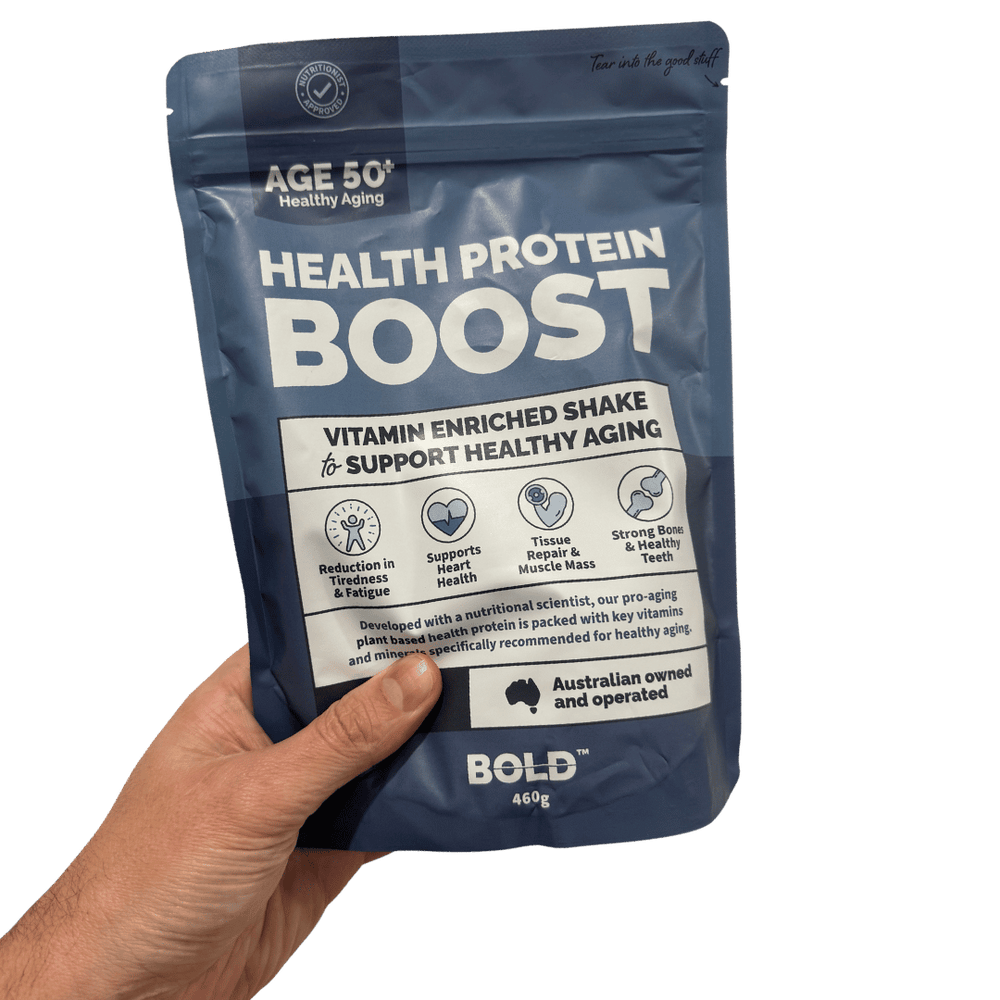The Amazing Connection between Energy Levels and Protein
Plus 3 nutrients that can help boost energy

Table of Contents
- The link between energy levels and protein intake
- Amino Acids and Energy
- Protein can help improve sleep quality
- Protein is important for the transportation and storage of iron
- Protein improves muscle mass and physical function
- Protein can help you avoid a sugar crash
- The link between digestive enzymes and energy levels
- Protein's role with enzyme production
- The link between Vitamin D and Energy Levels
- The link between Vitamin B12 and Energy Levels
Do you ever feel like you just can't get going? That no matter how much coffee you drink, or how many hours of sleep you get, you just can't seem to muster up the energy to tackle the day? If so, you're not alone. Millions of people around the world struggle with low energy levels on a daily basis. But what if I told you that there was something you could do about it?
In this blog post, we will explore the amazing connection between energy levels and protein. Plus we'll dive into how digestive enzymes, vitamin D and vitamin B12 can boost energy. We'll cover:
- How protein can be used as an energy source, help avoid sugar crashes and improve sleep quality,
- How digestive enzymes improve the absorption of nutrients to boost energy
- How vitamin D can help support the generation of energy, and
- The important role of vitamin B12 in energy production!
The link between Energy Levels and Protein Intake
Protein is important for a variety of roles in the body including being essential for muscle growth and repair, the production of enzymes and hormones, and the transportation and storage of minerals and vitamins.
But what does protein have to do with energy levels? As it turns out, quite a lot!
Amino Acids & Energy
Amino acids are primarily used to create and repair proteins, and generate hormones and neurotransmitters but in some situations, they can also be used as a source of energy. Several amino acids can be converted into sugar and released into the blood where they can then be used by tissues to generate energy. However, this process usually only occurs as a last resource. Let's explain.
Proteins (made up of a chain of amino acids) are a more complex structure to convert into energy in comparison to other energy sources such as carbohydrates and fats. The body will always opt for the most efficient way to generate energy. For this reason, it will utilise carbohydrates, fats and fat stores as an energy source before it uses protein. In fact, protein accounts for only 1% of the body's energy stores and is only available in a limited capacity.
So when would the body use protein as energy? Protein may be used as energy when the body is in a state of fasting. This may include:
- if the person is unwell
- they are on a low carb low-fat diet
- they are purposefully fasting
- or not consciously eating enough
In these cases, the body will draw from its protein stores and a person may see dramatic depletion in body mass protein. This occurs because energy takes priority and so the body will pull from whatever resources it has available.
For this reason, it is important you eat a well-balanced, nutrient-dense diet with a sufficient amount of protein.
Protein can help improve sleep quality
Protein may help you feel more energised in other ways such as it can help you sleep better. This is because protein helps to produce the sleepy hormone melatonin. Melatonin is naturally produced in the brain and released into the bloodstream to promote sleep. The main prompt for its release is darkness, while exposure to daylight inhibits its release.
So where does protein come into play? The melatonin production pathway starts with tryptophan, an amino acid that is commonly found in high protein foods such as chicken, fish, eggs, peanuts and turkey. Some studies show, that by eating tryptophan foods you may be able to improve melatonin production leading to better sleep.
So by eating a high protein diet, not only are you helping boost energy levels throughout the day, but you're also improving your chances of getting a good night's sleep!
Protein’s role in transporting and storing of iron
Protein is also important for the transportation and storage of iron. Iron is essential for energy production, as it helps to carry oxygen from our lungs to the rest of our bodies. Therefore, by ensuring you are getting enough protein in your diet you're helping to ensure that you have plenty of iron available to boost energy production!
Some simple ways to boost iron include:
- Eating animal protein with plant based iron sources such as eating beef with beans.
- Consume Vitamin C at the same time as eating high iron source as this helps with its absorption.
- Cook plant sources of iron as this helps free up the iron for better absorption.
Protein improves muscle mass and physical function
Protein may indirectly boost energy by increasing the body's muscle mass. As we mentioned in another article, protein is essential for building and repairing muscle tissue and helps us to grow bigger and strong muscles. In doing this, protein may help improve our physical function and the ability to be physically active.
We also know that when we are more physically active we tend to produce more energy. The more we move, the more energy we tend to have!
Protein can help you avoid a sugar crash
One reason why people often report having more energy from a high protein diet may be because it can help to avoid sugar crashes. When we eat sugary foods, our blood sugar levels spike dramatically and then crash soon afterwards. This leaves us feeling tired and lethargic, as our body frantically tries to bring our blood sugar levels back down to normal.
But by eating protein alongside high carbohydrate or sugary foods, we can help to slow down the absorption of that sugar into the bloodstream. This prevents those dramatic spikes and crashes in blood sugar levels, leaving us feeling more energised and sustained throughout the day.
The link between Digestive Enzymes and Energy Levels
As we mentioned earlier, protein isn't the only thing that can help improve energy levels - digestive enzymes can too!
So what is a digestive enzyme? Digestive enzymes are secreted by the pancreas (but are available in supplement form too) and play an important role in breaking down food into smaller units that can be better absorbed by the gut. When we eat our food, our bodies need to break that food down into smaller compartments. We do this through mechanical processes (chewing and churning in the gut) and chemical processes (enzymes).
Digestive enzymes break nutrients into smaller units that can then be absorbed through the gut and into the bloodstream where they can then be used in the production of energy.
Protein's role with enzyme production
Protein plays an important role here too as it is responsible for the formation and correct functioning of these enzymes. Enzymes themselves are made up of protein molecules.
So by ensuring you're getting enough protein in your diet you're providing the building blocks for enzyme production! In doing this, you’re helping your body to better digest and absorb food therefore boosting energy levels.
The link between Vitamin D and Energy Levels
And finally, we come to vitamin D - another nutrient that is essential for energy production.
What is vitamin D? Vitamin D is a fat-soluble vitamin that is produced when our skin is exposed to sunlight. Its main role in the body is as a hormone, and it plays an important role in regulating a number of bodily processes including helping your cells produce energy.
In fact, fatigue is a common symptom reported in people with vitamin D deficiency. Various studies found a significant improvement in energy when the vitamin D levels were increased in these patients.
Numerous studies have also found that vitamin D is important for supporting the function of mitochondria - the part of the cell that is responsible for energy production. The mitochondria take oxygen and glucose and convert them into a form of energy that can be used by the cells.
Another interesting point is vitamin D's effect on mental health. Studies show a link between depression and vitamin D deficiency. It's well documented that those who suffer from depression report low energy levels.
The Link Between Vitamin B12 and Energy Levels
Vitamin B12 is another vitamin that plays an important role in energy production. It helps the body to produce red blood cells which transport oxygen throughout the body and are essential for energy metabolism.
Several studies have found a link between low levels of vitamin B12 and fatigue, with increased energy levels reported after supplementation. Vitamin B12 is commonly found in animal-based food sources such as meat, eggs and milk.
B12 deficiency is therefore commonly seen in vegetarians and vegans who may not get enough from their diets alone. It is therefore important to ensure they are either supplementing or eating enough plant-based sources that are high in B12 such as some protein powders (BOLD Protein), nutritional yeast, seaweeds or tempeh.
Conclusion
So as you can see, protein, digestive enzymes, vitamin D and vitamin B12 are all essential for energy production. Ensuring that you have a good intake of these nutrients and optimising the function of your digestive enzymes, should help you to keep your energy levels high and sustained throughout the day!

References
- https://medlineplus.gov/ency/article/002222.htm#:~:text=Amino%20acids%20are%20molecules%20that,down%2C%20amino%20acids%20are%20left.
- https://pubmed.ncbi.nlm.nih.gov/20164320/
- https://www.nrv.gov.au/nutrients/protein
- https://www.nature.com/scitable/topicpage/nutrient-utilization-in-humans-metabolism-pathways-14234029/#
- https://news.sanfordhealth.org/healthy-living/sugar-crash-effects/
- https://pubmed.ncbi.nlm.nih.gov/26864362/
- https://www.sleepfoundation.org/melatonin#:~:text=Melatonin%20is%20a%20natural%20hormone,causes%20that%20production%20to%20stop.
- https://www.sleepfoundation.org/nutrition/food-and-drink-promote-good-nights-sleep
- https://www.healthline.com/health/tryptophan#foods-with-tryptophan
- https://www.betterhealth.vic.gov.au/health/conditionsandtreatments/iron
- https://www.betterhealth.vic.gov.au/health/conditionsandtreatments/iron
- https://www.boldhealth.com.au/blogs/bold-blog/muscle-mass-matters-importance-of-protein-for-ageing
- https://www.hopkinsmedicine.org/health/wellness-and-prevention/digestive-enzymes-and-digestive-enzyme-supplements
- http://healthline.com/health/why-are-enzymes-important#enzymes-and-digestion
- https://medlineplus.gov/genetics/understanding/howgeneswork/protein/#:~:text=Proteins%20are%20large%2C%20complex%20molecules,the%20body's%20tissues%20and%20organs.&text=These%20proteins%20provide%20structure%20and,allow%20the%20body%20to%20move.
- https://www.ncbi.nlm.nih.gov/pmc/articles/PMC4158648/
- https://www.ncl.ac.uk/press/articles/archive/2013/04/vitamindproventoboostenergyfromwithinthecells.html
- https://www.ncbi.nlm.nih.gov/pmc/articles/PMC6032156/
- https://www.ncbi.nlm.nih.gov/pmc/articles/PMC2908269/
- https://www.healthdirect.gov.au/foods-high-in-vitamin-b12
----------------------------------------------------------------------------------------------------------
Medical Disclaimer
The information provided in this blog post is for general information only, it is not intended as medical advice. For medical advice please consult with a qualified medical professional who is familiar with your individual medical needs.


